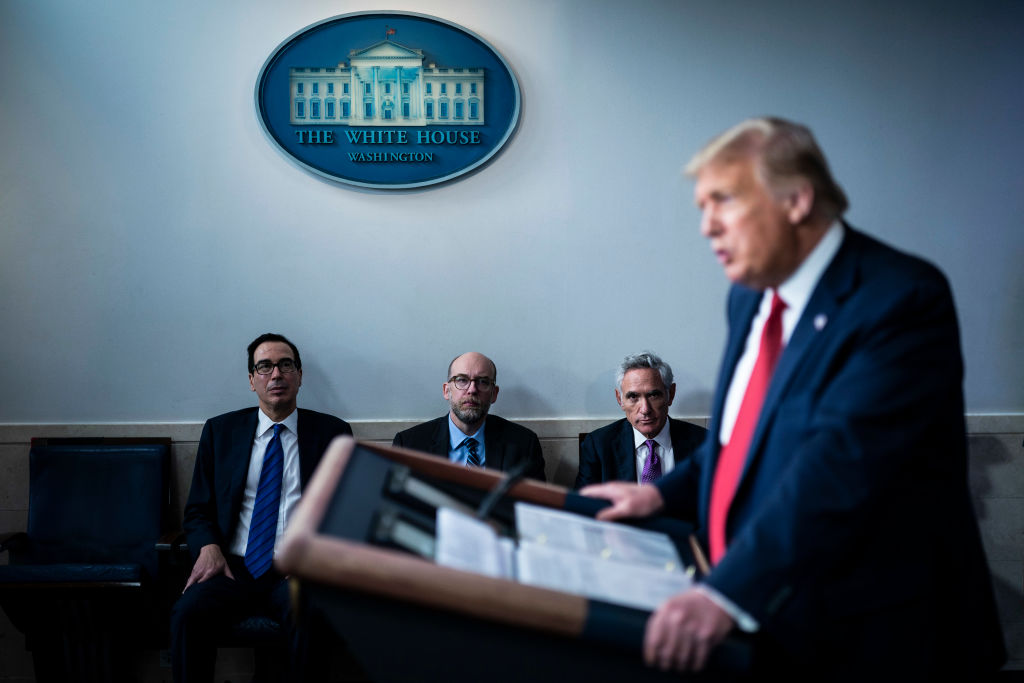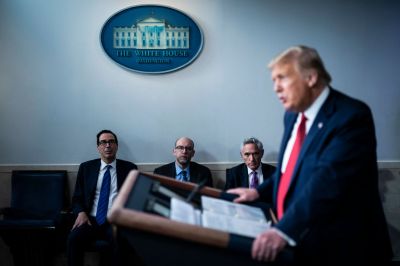If reelected in 2024, former President Donald Trump plans to resurrect a specific policy directive from his first term to target one of his former foils, the so-called “deep state.”
Trump’s signing of the executive order—known as “Schedule F”—in late October 2020 got buried beneath wall-to-wall election coverage and was promptly undone by President Joe Biden before it could be fully implemented. Proponents say it could have made the government more responsive and efficient, while opponents worry it would have been merely an excuse for politically motivated mass firings.
And even if Trump doesn’t secure the GOP nomination, other Republican candidates have spoken highly of the measure.
What is Schedule F?
The U.S. federal civil service—the roughly 2 million unelected, non-military employees of the federal government (“civil servants”)—can be divided into three broad categories: the “competitive service,” which is subject to merit-based hiring and firing processes; the “excepted service,” which is exempt from them; and a Senior Executive Service (SES) of higher-level administrators.
Borrowing language directly from the Civil Service Reform Act of 1978, Trump’s Executive Order 13957 created Schedule F as a new subcategory within the “excepted service” for “positions of a confidential, policy-determining, policy-making, or policy-advocating character” that wouldn’t previously have been subject to change as a result of a presidential transition.
Positions newly categorized as Schedule F would have been easier for the administration to hire and fire for: According to a 2022 report from the Government Accountability Office, in addition to a streamlined hiring process, “certain due process rights, such as notice of removal and the right to appeal removals to the Merit Systems Protection Board, would be unavailable to individuals in these positions.”
Trump’s order gave agency heads 90 days to cull through their rolls and report back to the director of the Office of Personnel Management (OPM) with an initial list of positions to re-categorize as Schedule F. (Conveniently, the deadline turned out to be January 19, 2021, one day before the end of Trump’s term.) If Biden hadn’t revoked the order, the agencies likely would have done a more thorough review on an annual basis going forward.
Because it was never fully implemented, it’s hard to know exactly how many civil service jobs would have been affected, but one Trump administration estimate put the number at 50,000—about 2.5 percent of the total federal workforce.
Exercising authority?
Although Trump’s framing of Schedule F tends to focus on liberal civil servants thwarting his agenda—which, given the size and Democratic lean of the federal bureaucracy, isn’t unfounded—some limited-government conservatives see Schedule F simply as a return to the fundamentals of the Constitution and the law.
“The government is supposed to be run by the president and his appointees,” said Donald Devine, who served as OPM director during Ronald Reagan’s first term as president. “It’s not up in the air.”
But bureaucratic bloat can make it more difficult for the president and his appointees to run the government. Recent efforts to modernize the electronic health records system of the Veterans Affairs hospital network, for instance, have run into trouble during both the Trump and Biden administrations, and Secretary of Veterans Affairs Denis McDonough announced a “reset” of the modernization program last month.
“In the private sector, if you’re losing money, if you’re failing, you get cut,” Devine said. “In the public sector, if you’re failing, you say, ‘Oh my god, we’ve got to get more money.’”
And while the Jimmy Carter-era Civil Service Reform Act that Devine helped implement as OPM director was good, its benefits have eroded over time. In his view, Schedule F wouldn’t be a panacea, but it would be a step in the right direction.
“We’re basically back where President Carter began,” Devine said. “Every president has given up because they all come to the conclusion—why fight all the bureaucrats and the unions?—and nobody gives a darn about how the government is run.”
Exorcizing competence?
Beyond concerns about Trump himself, critics of Schedule F worry it could ultimately make it harder for presidents to implement their policy agendas. With Schedule F positions stripped of the job protections of the competitive service, government supervisors may have a harder time recruiting talented candidates and retaining the independent expertise and institutional memory that political appointees rely on for their success.
The Office of Management and Budget (OMB) is not a typical government agency, but it may be a case in point. It’s one of the only parts of the Executive Office of the President (EOP) with career civil servants who stay on between administrations—at least for now. Before leaving office, the Trump administration approved a OMB request that 68 percent of its employees be recategorized as Schedule F. (Then-OMB Director Russell Vought was enthusiastic about Trump’s order.)
Turnover of those employees between administrations could hinder executive action, critics say. There is “a sense of serving the wider presidency, and not just the whims of the current president,” said Andrew Rudalevige, a political science professor at Bowdoin College. “But also you have expertise about how to do stuff. OMB certainly provided a lot of that to President Trump.” OMB staff were involved, for instance, in high-profile controversies such as declaring a national emergency to divert defense spending to a border wall and using apportionment power to delay military aid to Ukraine.
“There are all kinds of things they worked with to achieve presidential preferences that you might lose if you had shorter-term political appointments,” Rudalevige said.
Also worth considering is how the tradeoff between loyal effectiveness and independent advice differs from agency to agency. Greater presidential control over the Department of Agriculture might make sense, while greater control over the Department of Justice might be more worrisome.
“For each department and each position, precisely what are the advantages and disadvantages of making it a civil service position versus a political position?” asked Gergely Ujhelyi, an economist at the University of Houston. “I would like to see these types of arguments made explicit, rather than having broad policy proposals based on general statements about whether the current bureaucratic rules are ‘good’ or ‘bad.’”
Reaganite fixtures like Devine and contemporary figures like Sen. Josh Hawley agree that congressional action is the better way to work through such arguments, as opposed to executive orders. But don’t hold your breath.
“It’s going to be very hard to pass,” Rudalevige said.






Please note that we at The Dispatch hold ourselves, our work, and our commenters to a higher standard than other places on the internet. We welcome comments that foster genuine debate or discussion—including comments critical of us or our work—but responses that include ad hominem attacks on fellow Dispatch members or are intended to stoke fear and anger may be moderated.
With your membership, you only have the ability to comment on The Morning Dispatch articles. Consider upgrading to join the conversation everywhere.